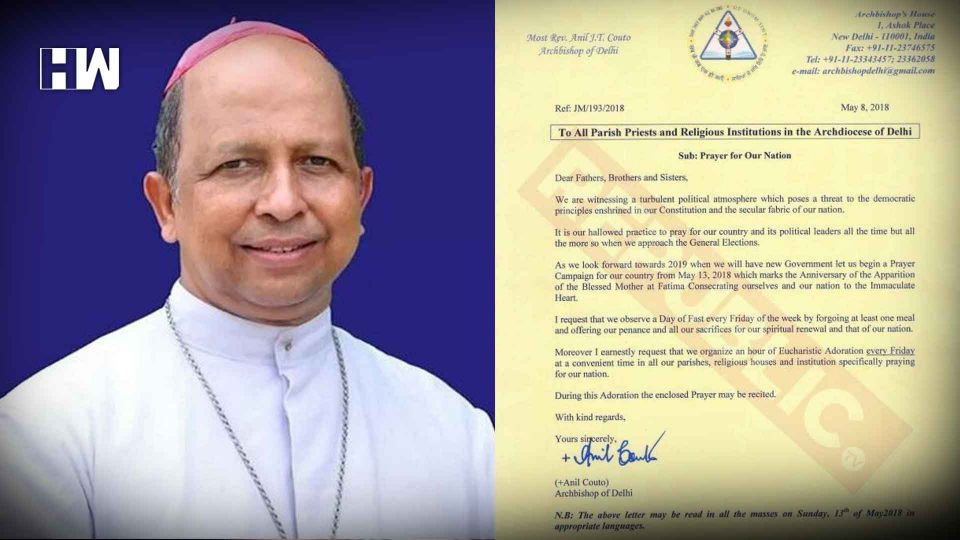In a country whose roots are based out of peace and harmony, the intervention done by political parties in religions only causes turmoil.
It was just yesterday that the Archbishop, Anil Couto from Delhi wrote a letter to the Catholics of the country asking them to go on a country-wide fast and prayers for an hour on Fridays, till the time elections aren’t contested in the country in 2019. This letter which went into circulation right after the Karnataka elections and BJP losing the Assembly elections was spread across as a warning sign since the letter mentioned that the country was in a “state of turmoil”.
 The letter asks for the prayers, fast and penance that should be offered for the ‘spiritual renewal of our nation’. The prayer that it contained called for “God’s grace to always uphold in highest esteem the dreams of our founding fathers’ and the values of our constitution that are equality, liberty and fraternity.”
The letter asks for the prayers, fast and penance that should be offered for the ‘spiritual renewal of our nation’. The prayer that it contained called for “God’s grace to always uphold in highest esteem the dreams of our founding fathers’ and the values of our constitution that are equality, liberty and fraternity.”

“May the ethos of true democracy envelop our elections with dignity and the flames of honest patriotism enkindle our political leaders. This is our cry, Heavenly Father, in these troubled times as we see the clouds eclipsing the light of truth, justice, and freedom,” says the prayer.
But…
This is not the first time this country has seen the intervention of religion in recent politics. Not too long ago, another Archbishop from Gujarat’s Gandhinagar just ahead of Gujarat elections in his plea to the Catholics asked Christians to save the country from “Nationalist forces”. The Archbishop’s comment was important because of the timing it held. It was definitely seen as a possible way of influencing the votes of the people of Gujarat.
Even before the Nagaland elections, the Nagaland Baptist Church Council had also pressed the believers to choose between ‘Trishul and the Cross.’ The Trishul was not their primary concern either. In one earlier instance, they resorted to calling Yoga a core Hindu practice and had asked their followers to stay away from it. Even ahead of the Goa elections, a Catholic magazine asked the voters in the state not to vote for the BJP and asserted that the country is facing a ‘constitutional holocaust’.
The outrage over Church’s comments are not new. It reminds us of Biblical times when a woman accused of adultery was to be stoned to death. The men asked Jesus “Teacher, what should we do with her?” Jesus asserted that any man who hasn’t sinned in his life will be the first one to stone her.
The story is more relevant today than ever, it also asks us to introspect. Before outraging over religious institutions interfering in politics, we must understand it was politics that started to plant its roots in religion.
The politics of religion
We hail from times when people get offended in a jiffy and take actions without having a second thought about consequences. Politicians aren’t any different from us.

Political leaders have started treating temples, masjids and mosques as vote banks and not as a place of worship. Rahul Gandhi, during campaigning for Gujarat elections, embarked upon a temple-hopping spree. Similarly, right before the Karnataka elections, he went to visit mosques, temples and churches. So much so that the Imams of masjids appealed the Muslim voters to go ahead and vote for Congress in the Assembly elections. BJP top guns Amit Shah and Narendra Modi also visited a number of Lingayat mutts in the run-up to Karnataka assembly elections.

This isn’t the premier play of religion card during an election by a national party. The strategy for Congress in Karnataka elections was to treat Lingayats as a different faith and try to gather votes from them. Though this strategy backfired, it was definitely seen as an attempt to manipulate the people.
Claiming what it is to be like
Rather than just flagrant ways of diverting vote banks through manipulation of people’s faith, political parties need to have their agendas set. What they fail to realise is that they are not treating two different institutions as separate entities. Politics is for governing people, religion, on the other hand, is to channelise a faith. When we mix the two, the country is bound to face situations like, in words of Archbishop a “state of turbulence”.
As an independent media platform, we do not take advertisements from governments and corporate houses. It is you, our readers, who have supported us on our journey to do honest and unbiased journalism. Please contribute, so that we can continue to do the same in future.

